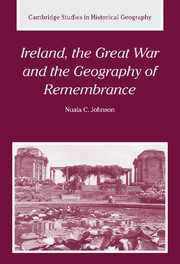Book contents
- Frontmatter
- Contents
- List of illustrations
- Acknowledgements
- 1 Geography, landscape and memory
- 2 A call to arms: recruitment poster and propaganda
- 3 Parading memory: peace day celebrations
- 4 Sculpting memory: space, memorials and rituals of remembrance
- 5 Scripting memory: literary landscapes and the war experience
- 6 Remembering the Easter Rebellion 1916
- 7 Conclusion
- Bibliography
- Index
- Cambridge Studies in Historical Geography
5 - Scripting memory: literary landscapes and the war experience
Published online by Cambridge University Press: 15 July 2009
- Frontmatter
- Contents
- List of illustrations
- Acknowledgements
- 1 Geography, landscape and memory
- 2 A call to arms: recruitment poster and propaganda
- 3 Parading memory: peace day celebrations
- 4 Sculpting memory: space, memorials and rituals of remembrance
- 5 Scripting memory: literary landscapes and the war experience
- 6 Remembering the Easter Rebellion 1916
- 7 Conclusion
- Bibliography
- Index
- Cambridge Studies in Historical Geography
Summary
if Turnage's aim … was to distil the grotesqueness of war into an aural equivalent of the serial geometrics invented by C. R. W. Nevinson … he succeeded …
This quote, from a review of the world premiere of Mark-Anthony Turnage's opera The Silver Tassie, which opened in the London Coliseum in February 2000, underlines the continuing imaginative appeal of the First World War as a source of creative energy. While the war was popularly commemorated through monument, memorial and spectacle, the war similarly spawned a vast array of literary works. If social memory found material expression through spaces of commemorative activity, the social imagination was also cultivated through representations of the experience of war in novel, play and verse. The war was mapped and its physical, cultural and psychological spaces made meaningful to popular audiences through these works. Ironically, fiction could at times translate that which documentary accounts found difficult to communicate. The upheavals of 1914 affected every reflective person across Europe: ‘Artists, poets, writers, clergymen, historians, philosophers, among others, all participated fully in the human drama being enacted … Even the introvert Marcel Proust … was spellbound by the spectacle.’ Hynes suggests that literary and artistic accounts of the war created a space for the articulation of an alternative view of the war that deviated from the romantic or heroic expression that appeared in other forms of commemoration.
- Type
- Chapter
- Information
- Ireland, the Great War and the Geography of Remembrance , pp. 112 - 140Publisher: Cambridge University PressPrint publication year: 2003



